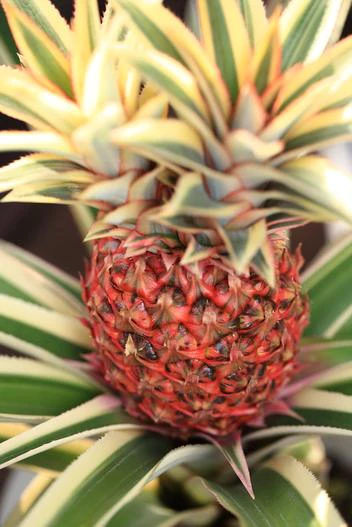Ornamental Pineapple
(Ananas comosus var. bracteatus)
Ornamental Pineapple (Ananas comosus var. bracteatus)
/
/

TANAKA Juuyoh (田中十洋)
CC BY 2.0
Image By:
TANAKA Juuyoh (田中十洋)
Recorded By:
Copyright:
CC BY 2.0
Copyright Notice:
Photo by: TANAKA Juuyoh (田中十洋) | License Type: CC BY 2.0 | License URL: https://creativecommons.org/licenses/by/2.0/ | Uploader: TANAKA Juuyoh (田中十洋) | Publisher: Flickr

Estimated Native Range
Climate Requirements for Papillion, Nebraska
| This Plant | Your Site | Plant Suitability for Your Location | ||
|---|---|---|---|---|
| • Precipitation | 56" - 84" | 30" | Your precipitation may be insufficient for this plant. Irrigate N" / year. | Irrigate N" / year |
| • High Temp. | 79°F - 90°F | 87°F | Your summer temperatures are normal for this plant. | Excellent |
| • Low Temp. | 47°F - 64°F | 12°F | Your winter temperatures may be too cold for this plant | Too cold |
This plant should grow well at your location with about N inches per year (Y minutes per month) of irrigation.
Summary
Ananas comosus var. bracteatus, commonly known as the ornamental pineapple, is a perennial herb that is a variant of the species Ananas comosus, which is known for its edible fruit. This variety, however, is primarily grown for its decorative qualities rather than fruit production. It is native to tropical American rainforests, where it thrives in warm, humid conditions with well-drained soils. The ornamental pineapple typically reaches a height of 2-3 feet (0.6-0.9 meters) and spreads 2-3 feet (0.6-0.9 meters) wide. It features a rosette of spiny, lance-shaped leaves and produces a striking flower head that is a composite of many flowers; these are followed by small, non-edible pineapples. The flower head is often red or purple with bright blue flowers, making it quite showy when in bloom.
The ornamental pineapple is valued for its exotic appearance and is often used in tropical-themed gardens, as a container plant, or as an indoor houseplant in colder climates. It requires minimal maintenance, making it a popular choice for gardeners seeking a tropical look with little effort. In cultivation, it prefers bright light but can tolerate part shade, and it requires a well-draining soil mix. While it is drought-tolerant once established, it benefits from regular watering during the growing season. It is not typically subject to serious pests or diseases, but root rot can occur in poorly drained soils.CC BY-SA 4.0
The ornamental pineapple is valued for its exotic appearance and is often used in tropical-themed gardens, as a container plant, or as an indoor houseplant in colder climates. It requires minimal maintenance, making it a popular choice for gardeners seeking a tropical look with little effort. In cultivation, it prefers bright light but can tolerate part shade, and it requires a well-draining soil mix. While it is drought-tolerant once established, it benefits from regular watering during the growing season. It is not typically subject to serious pests or diseases, but root rot can occur in poorly drained soils.CC BY-SA 4.0
Plant Description
- Plant Type: Herb
- Height: 3-6.5 feet
- Width: 3-4 feet
- Growth Rate: Moderate
- Flower Color: Red, Purple
- Flowering Season: Summer
- Leaf Retention: Evergreen
Growth Requirements
- Sun: Full Sun, Part Shade
- Water: Medium
- Drainage: Medium, Fast
Common Uses
Edible*Disclaimer: Easyscape's listed plant edibility is for informational use. Always verify the safety and proper identification of any plant before consumption., Low Maintenance, Potted Plant
Natural Habitat
Native to tropical American rainforests
Other Names
Common Names: Red Pineapple, Ananas-Do-Mato, Wild Pineapple
Scientific Names: Ananas comosus var. bracteatus, ? tricolor, Ananas bracteatus, Ananas bracteatus var. albus, Ananas bracteatus var. bracteatus, Ananas bracteatus var. rudis, Ananas bracteatus var. sagenarius, Ananas bracteatus var. striatus, Ananas bracteatus var. tricolor
GBIF Accepted Name: Ananas comosus var. bracteatus